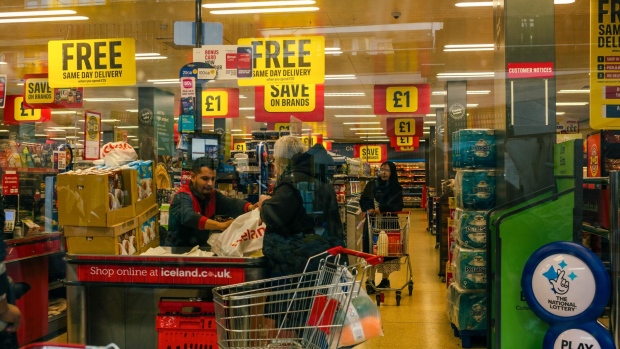Mar 22, 2023
UK Inflation Accelerates Unexpectedly Sticking in Double Digits
, Bloomberg News

(Bloomberg) -- UK inflation rose unexpectedly for the first time in four months after food and drink prices soared at the fastest pace in 45 years.
The Consumer Prices Index rose 10.4% in February after a 10.1% gain the month before, the Office for National Statistics said Wednesday. Economists had expected the reading to fall back into single digits.
The pound jumped after the report, which will fuel arguments that the Bank of England needs to boost interest rates again as soon as Thursday. Policy makers led by Governor Andrew Bailey must weigh stronger price pressures against signs that the quickest increases in borrowing costs in three decades are rattling markets.
“In recent days some have suggested that the febrile environment in the banking sector should give central banks pause for thought before raising rates further,” said Kitty Ussher, chief economist at the Institute of Directors. “Today’s data suggests the opposite. The Bank of England’s job is not yet done.”
The pound rose to the day’s high after UK inflation data surpassed forecasts, a sign traders expect the Bank of England will have to be more aggressive in raising interest rates. Money markets cranked up tightening wagers, fully pricing a quarter-point rate hike this week and raising the peak to 4.57% by August.
Read more: Pound Rallies After UK Inflation Beats Economists’ Estimates
What Bloomberg Economics Says ...
“An unexpected pick-up in both core and services inflation in February keeps the Bank of England on course to lift interest rates by 25 basis points on Thursday. We remain of the view that the move will be the final hike of the cycle with the recent tightening of financial conditions likely to weigh on demand in coming quarters and inflation set to fall more meaningfully over 2Q23.”
—Dan Hanson, Bloomberg Economics. Click for the REACT.
Once almost certain of another hike this week, investors now have Thursday’s decision on a knife edge after turmoil in the banking industry rattled markets.
The UK central bank already was sending more neutral signals about the future direction of rates. Bailey has said investors shouldn’t assume more hikes are needed even before regulators stepped in to rescue Silicon Valley Bank and Credit Suisse Group AG.
Inflation peaked at 11.1% in October and is expected to drop sharply this year as comparisons with 2022, when energy prices soared, drop out of the mix. The BOE and Office for Budget Responsibility both expect CPI at 9.7% in the first quarter, with the OBR seeing inflation below target in the first quarter of 2024 and the BOE three months later.
Chancellor of the Exchequer Jeremy Hunt warned that falling inflation “isn’t inevitable.”
“We recognize just how tough things are for families across the country, so as we work towards getting inflation under control we will help families with cost of living support worth £3,300 on average per household this year,” Hunt said.
Food and non-alcoholic drinks rose 18%, which was the most since August 1977. A major factor was alcohol served in restaurants, cafes and pubs. Prices rose for a wide range of drinks — gin, whiskey and various beers.
Clothing and footwear rose 8.1% in the year to February.
On a monthly basis, CPI rose by 1.1% in February 2023, compared with a rise of 0.8% in February 2022.
Prices usually rise between January and February as new stock starts to enter the shops following the new year sales period. However, the increases this year are the largest observed between January and February since 2012. The price movements reflect the amount of discounting observed in the datasets.
There were signs of domestic price pressures being more stubborn than the BOE expected. Core inflation – which excludes volatile food and energy prices – picked up to 6.2%, an acceleration from 5.8%.
Services inflation – a measure being watched by the BOE and seen as an early indicator of wage pressures – jumped from 6% to 6.6%.
There were encouraging signs that pipeline price pressures were easing, with factory output and input prices both declining on the month. The cost of fuel and raw materials rose 12.7% from a year earlier, the slowest pace since September 2021. That reflected a drop in the price of crude oil and petroleum products.
“This year will still be a high-inflation environment for both households and businesses,” said Alpesh Paleja, the lead economist at the CBI. “The firmness in domestic price pressures is something that the Bank of England will be keeping a close eye on.”
--With assistance from James Hirai.
(Updates with comment from fourth paragraph.)
©2023 Bloomberg L.P.






